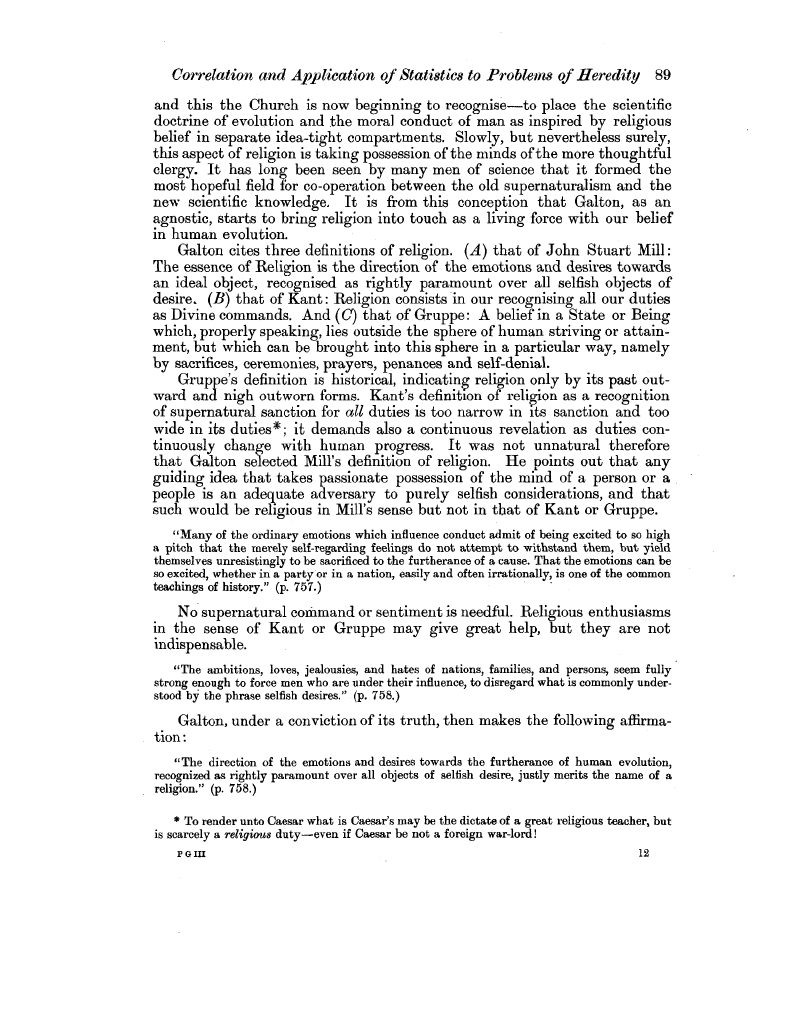| ||||||

OCR Rendition - approximate
Correlation and Application of Statistics to Problems of Heredity 89 and this the Church is now beginning to recognise-to place the scientific doctrine of evolution and the moral conduct of man as inspired by religious belief in separate idea-tight compartments. Slowly, but nevertheless surely, this aspect of religion is taking possession of the minds of the more thoughtful clergy. It has long been seen by many men of science that it formed the most hopeful field for co-operation between the old supernaturalism and the new scientific knowledge. It is from this conception that Galton, as an agnostic, starts to bring religion into touch as a living force with our belief in human evolution. Galton cites three definitions of religion. (A) that of John Stuart Mill: The essence of Religion is the direction of the emotions and desires towards an ideal object, recognised as rightly paramount over all selfish objects of desire. (B) that of Kant : Religion consists in our recognising all our duties as Divine commands. And (C) that of Gruppe : A belief in a State or Being which, properly speaking, lies outside the sphere of human striving or attainment, but which can be brought into this sphere in a particular way, namely by sacrifices, ceremonies, prayers, penances and self-denial. Gruppe's definition is historical, indicating religion only by its past outward and nigh outworn forms. Kant's definition of religion as a recognition of supernatural sanction for all duties is too narrow in its sanction and too wide in its duties*; it demands also a continuous revelation as duties continuously change with human progress. It was not unnatural therefore that Galton selected Mill's definition of religion. He points out that any guiding idea that takes passionate possession of the mind of a person or a people is an adequate adversary to purely selfish considerations, and that such would be religious in Mill's sense but not in that of Kant or Gruppe. "Many of the ordinary emotions which influence conduct admit of being excited to so high a pitch that the merely self-regarding feelings do not attempt to withstand them, but yield themselves unresistingly to be sacrificed to the furtherance of a cause. That the emotions can be so excited, whether in a party or in a nation, easily and often irrationally, is one of the common teachings of history." (p. 757.) No supernatural command or sentiment is needful. Religious enthusiasms in the sense of Kant or Gruppe may give great help, but they are not indispensable. "The ambitions, loves, jealousies, and hates of nations, families, and persons, seem fully strong enough to force men who are under their influence, to disregard what is commonly understood by the phrase selfish desires." (p. 758.) Galton, under a conviction of its truth, then makes the following affirmation "The direction of the emotions and desires towards the furtherance of human evolution, recognized as rightly paramount over all objects of selfish desire, justly merits the name of a religion." (p. 758.) To render unto Caesar what is Caesar's may be the dictate of a great religious teacher, but is scarcely a religious duty-even if Caesar be not a foreign war-lord! P o III 12
|